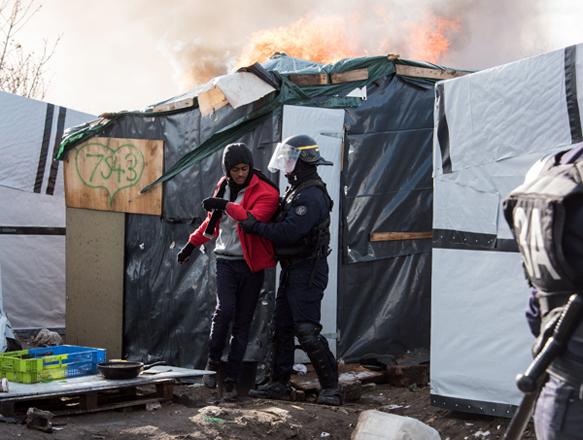You are here
New refugee camp opens in northern France as Calais residents protest
By AFP - Mar 07,2016 - Last updated at Mar 07,2016

A French riot police officer tries to stop a migrant from returning to his makeshift accommodation that is on fire during the dismantling of the southern part of the so-called 'Jungle' migrant camp in Calais, northern France, on Monday (AFP photo)
CALAIS, France — France's first international-standard refugee camp opened in the teeth of official opposition Monday while Calais residents protested over the impact of the migrant crisis.
Three families of Iraqi Kurds were the first to arrive at the new camp in Grande-Synthe near Dunkirk on the northern French coast, an AFP reporter said.
They came from another site nearby where around 1,000 people have been living in miserable conditions with limited protection from the cold.
The new camp, featuring some 200 heated wooden cabins and proper toilets and showers, has been built by Doctors Without Borders (MSF) with the support of the local town hall, despite opposition from the French government.
It lies around 40 kilometres from the largest refugee camp on the outskirts of the port city of Calais, nicknamed the "Jungle", which is being gradually demolished by the authorities.
The new, 3.1-million-euro ($3.4 million) migrant accommodation at Grande-Synthe is thought to be the first in France to meet international standards, and MSF said they hoped soon to have 375 cabins, catering for 2,500 people.
"It's a great day for human solidarity," said local mayor Damien Careme, who fought a battle with the authorities over its construction.
"I've overcome a failure of the state," he said, adding that he could no longer stand the sight of around 75 children living in the original camp.
The move has frustrated the government which has been trying to move refugees away from the northern coast and into centres where their movement is more controlled.
The government's representative in northern France, Jean-Francois Cordet, said last month: "The government's policy is not to reconstitute a camp at Grande-Synthe, but to make it go away."
Several hundred residents from Calais travelled to Paris on Monday to demand state support in the face of a huge loss of business caused by the migrant crisis in the port city.
"We are the closest point to Britain and there aren't any English people left in the streets of our town," said Antoine Ravisse, one of the organisers, estimating that Calais had lost around 40 per cent of its trade since the crisis became acute last summer.
The protesters were demanding a 10-year tax moratorium for the town, and a delegation was received at the president's Elysee Palace.
Meanwhile, demolition resumed for a second week in the Jungle camp outside Calais.
A group of children tried to offer white roses to the line of riot police holding back migrants and volunteers as workers resumed the dismantling of makeshift shelters.
Thousands of migrants have been living in the Jungle and other smaller camps along the northern coast, desperate to reach Britain where many have family or community ties and see better hopes of gaining employment or education.
Most have turned down offers from the French government to move into heated containers alongside the Jungle, or into accommodation centres elsewhere in France, fearing doing so would end their dreams of reaching Britain.
Unlike these alternatives, the new camp at Grande-Synthe will not restrict the movement of migrants and refugees, MSF said.
Related Articles
CALAIS, France — President Emmanuel Macron vowed on Tuesday that France would not allow another migrant camp like the infamous "Jungle"
CALAIS, France — On the northern French coast, dozens of migrant teenagers are living in miserable conditions in the forest while waiting to
CALAIS, France — French police on Tuesday dismantled a camp of about 800 migrants in the port city of Calais, the biggest such operation sin

















